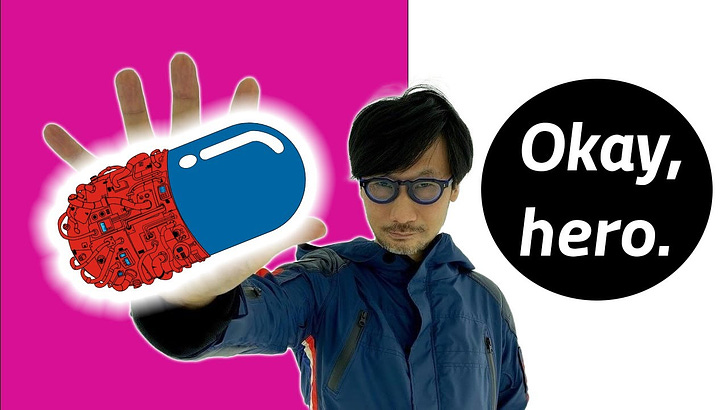A few years ago, I reviewed an essay collection, titled Okay, Hero, about Hideo Kojima’s video game series, Metal Gear Solid. The co-authors, Reid McCarter, Ed Smith, and Astrid Rose, also co-hosts of the podcast Bullet Points, about shooters, really got me thinking about Kojima, his fans, and his critics, on our yearslong journey together trying to make one video game designer make perfect sense.
In this very newsletter I once quoted Smith at length, in a review of Wolfenstein: Youngblood, remarking on his disenchantment with video games and games criticism. Here I’ll sample him again:
Basically, when I began work as a critic, I believed (and advocated) that the most ludicrous videogame genre could be elevated by the appearance of social or political personalities; an industry and creative environment that encouraged videogames to opinionate on our world directly, and experiment with idiosyncratic, tendentious styles and stories, would mean that something as historically banal as the first-person shooter could become fascinating.
Now, at the end of my critical career, I’m resigned to the belief, evident in a game like Wolfenstein: Youngblood, that mere apparentness of ‘social or political personality’ is not enough to make any videogame worthwhile.
The insipidness of the big-budget game, as it exists today, as it’s been cultivated into existence by the last 25 years of videogame culture, cannot, as I once thought, be redeemed by political, satirical, or didactical intent—a bland shooting game that parodies contemporary facism remains a bland shooting game, or put another way, it’s not just the stories and writing (or lack of) that make most videogames feel redundant to me, it’s the mechanics as well.
I don’t belong on the zeppelin any more.
This stuck with me and complicated my thoughts for a long while.
There’s no manner of ideological essaying that’s going to rehabilitate a mechanically boring or broken game. That’s whether the essaying is in the game, in the promo, or in the reviews. Likewise “good politics” won’t make a great game. In any case games, and other art, aren’t necessarily built for topline political pronouncements or pass-fail assessments from activists.
I do think art can stumble into conversations other than the ones strictly dictated by the script and the marketing. I think the anti-woke hectoring of progressive critics can be just about as strident and stifling as the orthodoxy it purports to oppose. The problem that’s often expressed as “the politicization of games and criticism” is really, I think, “the homogenization of games and criticism.” We need variety. We need balance. Because reasonable people will have different tolerances for different styles of criticism. We’re all special little bundles of expectations.
That said, I disagree with Smith insofar as I still believe video games can — not must, and not always, but they can — heighten our awareness and deepen our connection with the real world (of which the political world is only a slice). We don’t doubt the power of literary fiction to do this, when it’s equipped to do this, escapist or not. I don’t see why I should think any less of the stuff in my Steam library. I still love video games, I’m afraid.
And the main reason I still believe this much, despite the many ways games embarrass themselves, and critics embarrass ourselves, is Kojima. He’s not a war historian. He’s not a political theorist. He’s not an activist. He’s an oddball director whose video games are often, iconically, splitting the difference between reality and lunacy. Such is the writing and direction of various geopolitical fictions by a man who freely admits he learned everything he knows from movies. And yet, time and again, he achieves something shockingly real.
It’s hard to write about Kojima in the heat of the release cycles for his games. They’ve gotten so long and complex, in writing and design, and the execution windows and attention spans are only ever getting shorter. And I’m only ever getting older. So I’ve taken the downtime since Death Stranding to spell out the impression Kojima’s games have made on me over the years.
As for why I’ve done this in the form of a video essay, as opposed to my usual writing, well, I wanted to challenge myself a bit. There’s a rather frustrating division in modern criticism, between web writers and video essayists. There’s a sort of Cold War. It’s micro-generational. It’s based in large part on dissillusionment with modern journalism and pessimism about its commercial viability. It’s also based in some pettiness and double standards. In any case, I wish this division didn’t exist. So here I am, in the spirit of Sam’s post-apocalyptic mission in Death Stranding, rebuilding a bridge.


